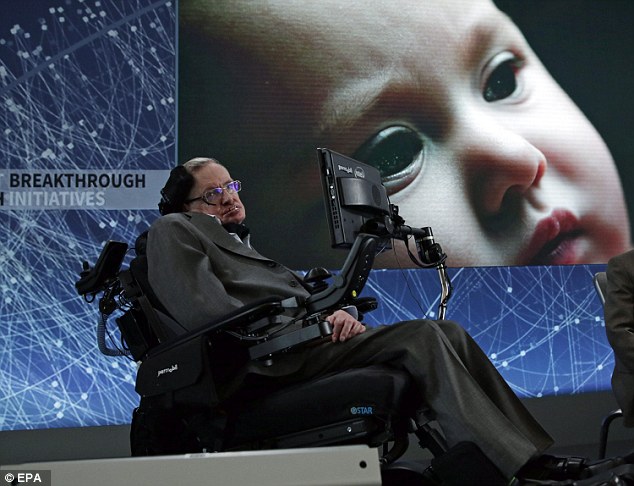

Black holes have long been regarded as ‘eternal prisons’ for all that is sucked into their depths.
But according to Stephen Hawking, there may be a way out.
The world renowned theoretical physicist explained these concepts at the inauguration of Harvard’s Black Hole Initiative on Monday, launching the program that will focus specifically on black hole research.

The world renowned theoretical physicist explained his theories at the inauguration of Harvard’s Black Hole Initiative on Monday, launching the program that will focus specifically on black hole research. Pictured above is an artist's impression, illustrating the tremendous gravitational pull of a giant black hole ) on a passing star
The lecture was held at Harvard’s Sanders Theatre, where Hawking spoke for a crowd of more than 1,000 people.
Hawking is the director of research at the Centre for Theoretical Cosmology at the University of Cambridge in England, and over the past few years has revealed his theories on the ‘lost’ information that gets sucked into black holes.
He suggests this information may be stored in alternate universes, and may not be gone forever as is typically believed.
Through the Black Hole Initiative, Harvard experts will join forces to ‘cultivate a sort of culture of people interested in black holes,’ said Chair of the Harvard Department of Astronomy Avi Loeb, The Harvard Crimson reports.
This will allow faculty along with undergraduate and graduate students to participate in research and workshops on black holes.
In the lecture, Hawking also discussed the recent discovery of gravitational waves.
Revealed in February, the theoretical cosmologist says the breakthrough provided some of the first solid evidence of the existence of black holes, according to The Boston Globe.
‘Black holes aren’t the eternal prisons they were once thought,’ he reminded the audience on Monday.
‘Things can get out of a black hole, both from the outside and possible through another universe.
‘So if you feel you’re in a black hole, don’t give up. There’s a way out.’

This lecture follows the recent launch of Hawking’s $100m project, a collaboration with Russian billionaire Yuri Milner and Mark Zuckerberg, called Breakthrough Starshot. Pictured above, Stephen Hawking addresses the media during a press conference on top of One World Trade Center in New York, New York, 12 April 2016
The theoretical physicist likened the return of information to a burned encyclopaedia, where information wouldn’t technically be lost, but would be incredibly hard to decipher.
Black holes could be massive entities – as big as the distance from the sun to Jupiter – Hawking explained, but they could also be as small as a mountain.
This lecture follows the recent launch of Hawking’s $100m project, a collaboration with Russian billionaire Yuri Milner and Mark Zuckerberg, called Breakthrough Starshot.
The team has designed a project that on tiny so-called 'nanocraft' flying on sails pushed by beams of light through the universe.
They will travel to the Alpha Centauri star system 25 trillion miles (4.37 light years) away on a twenty year mission to look for alien life.
BREAKTHROUGH STARSHOT
Stephen Hawking has teamed up with Russian billionaire Yuri Milner and Mark Zuckerberg to launch the most ambitious alien-hunting mission in history.
The $100m project, called Breakthrough Starshot involves deploying thousands of tiny spacecraft to travel to our nearest star system and send back pictures.
If successful, scientists could determine if Alpha Centauri, a star system about 25 trillion miles away, contains an Earth-like planet.
The small light-propelled vehicles will carry equipment like cameras and communication equipment.
Scientists hope the vehicles, known as nanocraft, will eventually fly at 20 per cent of the speed of lightt.
BLACK HOLES DON'T DELETE INFORMATION, ANOTHER SCIENTIST CLAIMS
Stephen Hawking isn't the only expert who thinks black holes don't delete the information they 'swallow'.
Dejan Stojkovic, an associate professor of physics at the University at Buffalo believes interactions between particles emitted by black holes could reveal what lies inside them.
'According to our work, information isn't lost once it enters a black hole. It doesn’t just disappear,' he said in April.
He demonstrated how the information is preserved using mathematical equations.
But how exactly it's possible to recover information from a black hole has remained a topic of debate.
Instead of looking only at the particles a black hole emits, the Professor Stojikovic also takes into account the subtle interactions between the particles.
Interactions between particles can range from gravitational attraction to the exchange of mediators like photons between particles.
Such 'correlations' have long been known to exist, but many scientists discounted them as unimportant in the past.
'These correlations were often ignored in related calculations since they were thought to be small and not capable of making a significant difference,' Stojkovic says.
'Our explicit calculations show that though the correlations start off very small, they grow in time and become large enough to change the outcome.'
 The evolution of J-10 fighter
The evolution of J-10 fighter Top 10 Asian beauties in 2016
Top 10 Asian beauties in 2016 What's happening in Xisha Islands?
What's happening in Xisha Islands? When female soldiers meet flowers
When female soldiers meet flowers North Sea Fleet conducts drill in West Pacific Ocean
North Sea Fleet conducts drill in West Pacific Ocean Old photos record the change of Sichuan over a century
Old photos record the change of Sichuan over a century Breathtaking aerial photos of tulip blossoms in C China
Breathtaking aerial photos of tulip blossoms in C China Horrific: Pit swallows 25 tons of fish overnight
Horrific: Pit swallows 25 tons of fish overnight Vietnamese Su-30 fighters fly over Nanwei Island in South China Sea
Vietnamese Su-30 fighters fly over Nanwei Island in South China Sea Top 20 hottest women in the world in 2014
Top 20 hottest women in the world in 2014 Top 10 hardest languages to learn
Top 10 hardest languages to learn 10 Chinese female stars with most beautiful faces
10 Chinese female stars with most beautiful faces China’s Top 10 Unique Bridges, Highways and Roads
China’s Top 10 Unique Bridges, Highways and Roads Code spy sentenced to death
Code spy sentenced to death Toxic schools raise ‘Love Canal’ spectre
Toxic schools raise ‘Love Canal’ spectre Forum on anti-communist purge in Indonesia laudable
Forum on anti-communist purge in Indonesia laudable Courier firm calls for people to respect employees after video of beating goes viral
Courier firm calls for people to respect employees after video of beating goes viralDay|Week